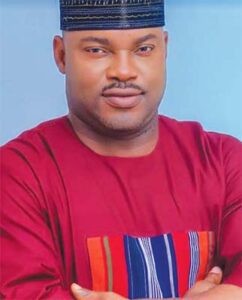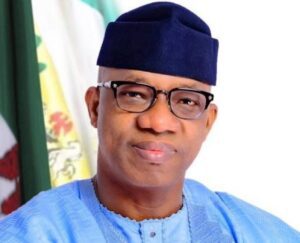
Platinum Consultants require tertiary institutions to be accountable — Oyo Education Commissioner
While many have commended the determination of the Oyo State Government to revamp the education sector with initiatives which include the abolition of 3,000 levy, allocation of 22% budget to education, the provision of customized textbooks and past questions to students’ which enabled the State to move from 26th to 11th position in WAEC, labour unions in Oyo State-owned tertiary institutions have been complaining about the Platinum Consultant innovation introduced by the government to oversee the expenses of the institutions. In this interview with ANU OYELEYE of Nigerian NewsDirect, the Commissioner for Education, Science and Technology, Honourable Olasukanmi Olaleye explained the government’s position on the issue and shed light on the laudable steps taken by the present administration to reposition education in Oyo State.
One of the hottest topics in education sector in Oyo State is the issue of the Platinum Consultants overseeing our tertiary institutions, what is the way forward?
Well, the tertiary institutions are always eager to collect subventions from the government but they don’t want to state how their revenue is being spent. The Consultants do not dictate how the these institutions should spend the funds allotted to them but only requires them to be accountable, The initiative is just for efficiency and transparency. If you say you got something for N200, the consultant ensures that you indeed got it for that price. Incidentally, not all the institutions see the initiative as an hindrance. Some of them are reasoning with us on this issue. If the government is paying salaries and ensuring promotions regularly, it expects the institutions to be transparent about the funds that is generated. I don’t see where the government has gone wrong. If they don’t want government to look into their accounts, then they should not collect subventions from government. I don’t see any justification for the on-going strike.
How does Oyo State education system compare to the rest of the nation?
Oyo State cannot be likened with other State; we are deeply committed to serving the people. In the education sector, you would recall that about three months ago, this government supplied education equipments to special schools in Oyo State with the aim of enhancing learning among persons with disabilities and currently we are taking delivery of science equipments which will be distributed to our schools in Oyo State. The government has been able to resolve the lingering issues that have been affecting education sector in Oyo State. For example, the government has been paying the salaries of staff of Ladoke Akintola University of Technology (LAUTECH) and has succeeded in taking the full ownership of the instititution. Recently, the government has approved the upgrade of Emmanuel Alayande College of Education to a University of Education. We shall soon commence the process of applying to the National Universities Commission (NUC) for approval.
In the face of the funding challenges faced by higher institution, was the upgrade of Emmanuel Alayode College of Education to a University necessary?
With the upgrade, there won’t be funding challenges because we conducted our feasibility studies before taking that step. In the last few years, the institution has been running a degree programme for another University and they pay huge sum to the school. We also realized that the enrolment for National Certificate in Education which is the core mandate of the College is just 30% while the affiliate programme has 70% of the students population. This means if the school is upgraded, the will be increase in enrolment. Also, the infrastructure and personnel in that school is at par with those at the Universities. With the upgrade, the institution will now be producing graduates with improved pedagogical skills, teachers that would be able to impart the education sector in Oyo State. That is a great advantage.
On the issue of security, is there an approach being worked on to ensure the security of teachers and students, and prevent their abduction in the SouthWest?
On Security, we issued a circular to the managements of our schools, directing them on steps they must take to ensure the safety of both teachers and students. The State government is already trying to collaborate with a private company to ensure that satellite cameras are installed in schools in Oyo State. To demonstrate the efficiency of the initiative, the company has installed cameras to 10 schools. This initiative will enable security agencies to be able to monitor the activities in our public schools. The Government intends to include most schools especially those that have boarding facilities.
A recent Stakeholders’ Appraisal shows that the free education system has reinstated 43,000 out of school children back to school, this is a no doubt a feat but it’s still a long way to over 400,000 out of school children recorded in Oyo State. How does the Ministry plan to ensure that the total number is reinstated?
The 43,000 figure was as at 2019-2020, there has been an improvement on that, another 11,000 have been reinstated. I think the fact the government has removed levies and is providing free textbooks will gradually help us to reduce the number.
What is your view on the state of public libraries in Oyo State? How does the Ministry plan to improve these libraries?
The libraries in Ibadan, Ogbomoso axis have enough books. However, the State is working towards digitalizing the libraries and provide resources online. That way people can assess knowledge materials online. I have had meetings with the librarians to ensure that.
What is your level of optimism for the future of education in Oyo State?
With the current path we are treading, Oyo State will soon be able to boost of the best education system in the country. In the next few days, we will be inaugurating a committee that is charged to develop a new scheme of work for the primary and secondary curriculum with a major focus on ICT and basic Technology. They are going collaborate with the private sector and the tertiary institutions to achieve this. The objective is to ensure a shift to practical learning in schools. Also, the training of the newly employed 5,000 teachers will commence any moment from now. The training will be comprehensive and Oyo State would have teachers that can have great impact on the education sector. The analysis of our performance in the last WAEC examination was quite encouraging. The students had up to 70% pass rate in science subjects. By and large, the future looks bright for the education sector.



